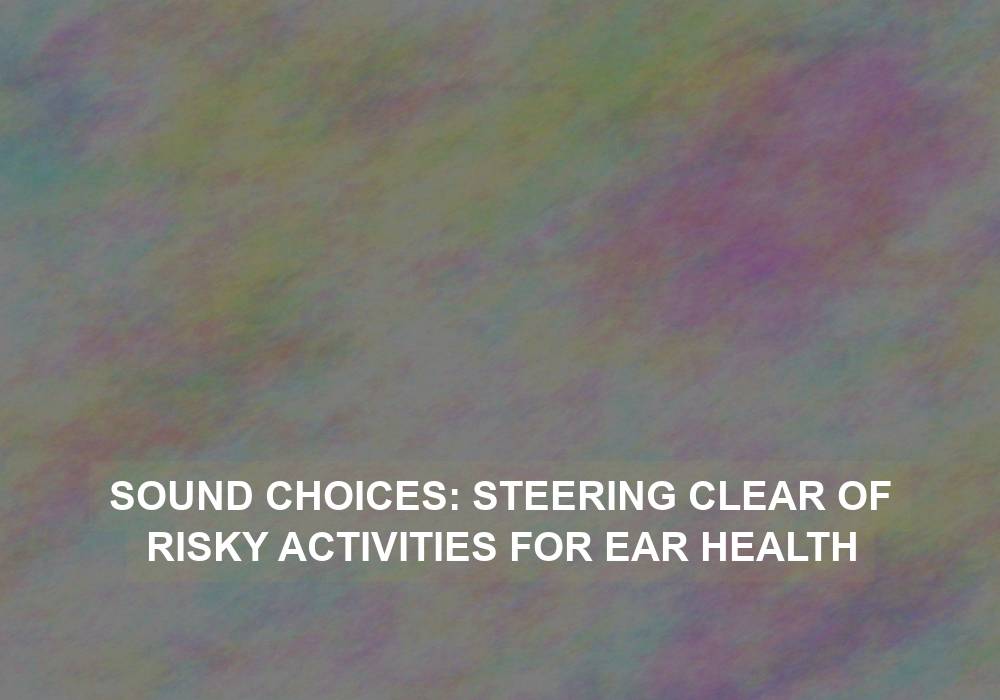The human ear plays a vital role in our everyday lives, enabling us to communicate, enjoy music, and experience the world around us. It is essential to prioritize ear health and take necessary precautions to prevent any potential damage. In this article, we will explore various risky activities that can harm our ears and provide practical tips to maintain optimal ear health.
Importance of Ear Health
Our ears are responsible for capturing sound waves and transmitting them to the brain for interpretation. Any damage to the delicate structures of the ear can lead to hearing loss, tinnitus (ringing in the ears), and other debilitating conditions. Additionally, maintaining good ear health not only ensures clear hearing but also contributes to overall well-being.
To maintain optimal ear health, it is crucial to take proactive steps to protect our ears and prevent potential hearing problems. By doing so, we can enhance our quality of life and reduce the risk of developing hearing-related issues.
Risky Activities for Ear Health
-
Listening to Loud Music: Exposure to loud music, whether through headphones or at concerts, can significantly damage our ears. Prolonged exposure to sound levels exceeding 85 decibels (dB) can lead to noise-induced hearing loss. To protect our ears, it is crucial to limit the volume and duration of loud music. Consider using noise-cancelling headphones or earplugs to reduce the impact of loud noises.
-
Using Cotton Swabs: Many of us have the habit of cleaning our ears with cotton swabs. However, this practice is not only unnecessary but also potentially harmful. Inserting cotton swabs into the ear canal can push earwax deeper, leading to blockages and damaging the eardrum. Instead, it is advisable to let the natural process of earwax removal occur. If necessary, seek professional help from an audiologist or an ear, nose, and throat specialist to safely remove excess earwax.
-
Engaging in Water Activities: Activities like swimming or diving can pose risks to our ear health. Water entering the ear canal can lead to infections, commonly known as swimmer’s ear. To prevent water from entering the ears during water-related activities, it is essential to wear waterproof earplugs or custom-fitted swim molds. Additionally, drying the ears thoroughly after swimming or showering can help minimize the risk of infections.
-
Ignoring Ear Protection: Exposure to loud noise in various environments, such as construction sites, concerts, or sporting events, can cause irreversible damage to the ears. Wearing ear protection, such as earmuffs or earplugs, in such situations is crucial to minimize the risk of hearing loss. Invest in high-quality ear protection that effectively reduces noise levels without compromising comfort.
-
Participating in Contact Sports: Certain contact sports, like boxing or rugby, can increase the likelihood of ear injuries. Repeated blows to the ear can result in a condition called cauliflower ear, where the outer ear becomes deformed and swollen. To reduce the risk of such injuries, it is important to wear protective headgear, including ear guards, during contact sports. These provide cushioning and prevent direct impact to the ears.
-
Using Unsafe Earphones/Headphones: Poorly designed or low-quality earphones/headphones can transmit excessive sound directly into the ear canal, leading to potential hearing damage. To protect your ears, invest in high-quality, noise-canceling earphones/headphones. These devices not only provide better sound quality but also allow you to enjoy music at lower volumes, reducing the risk of hearing damage.
Tips for Maintaining Optimal Ear Health
Now that we are aware of the risky activities, let’s explore some practical tips to maintain optimal ear health:
-
Monitor Volume Levels: When listening to music or other audio, ensure that the volume is set at a safe level. As a general rule, try to keep the volume below 60% of the maximum capacity of your device. Consider using volume-limiting features available on smartphones or audio devices to prevent accidental exposure to high volumes.
-
Take Listening Breaks: If you find yourself continuously exposed to loud sounds, whether at work or during recreational activities, make it a habit to take regular breaks to give your ears some rest. This helps reduce the risk of overexposure to noise and allows your ears to recover from any potential damage.
-
Keep Ears Dry: After engaging in water-related activities, make sure to thoroughly dry your ears using a towel or a hairdryer on a low setting. Excessive moisture in the ear canal can create a favorable environment for bacterial growth and increase the risk of infections. By keeping your ears dry, you can minimize the chances of developing swimmer’s ear or other water-related ear infections.
-
Maintain Cleanliness: Clean the outer part of your ears gently with a damp cloth. Avoid inserting any objects, including cotton swabs, into the ear canal. The ear canal has a self-cleaning mechanism that naturally pushes earwax out. Using cotton swabs or other objects can disrupt this process and potentially cause damage to the delicate structures of the ear.
-
Regular Hearing Check-ups: Schedule regular check-ups with an audiologist to monitor your ear health. They can conduct hearing tests and provide guidance on maintaining optimal ear health. Early detection of any hearing problems can help prevent further deterioration and allow for timely intervention, if necessary.
-
Educate Others: Spread awareness about the importance of ear health among your friends, family, and community. Encourage them to adopt healthy practices and protect their ears from potential harm. By educating others about the risks associated with certain activities, you can contribute to creating a safer environment for everyone’s ear health.
Conclusion
Taking care of our ears should be a priority to ensure long-term ear health and prevent hearing-related issues. By avoiding risky activities, such as listening to loud music, using cotton swabs, or participating in contact sports without protection, we can significantly reduce the risk of ear damage. Remember to follow the tips mentioned above and prioritize regular check-ups to maintain optimal ear health throughout your life.
